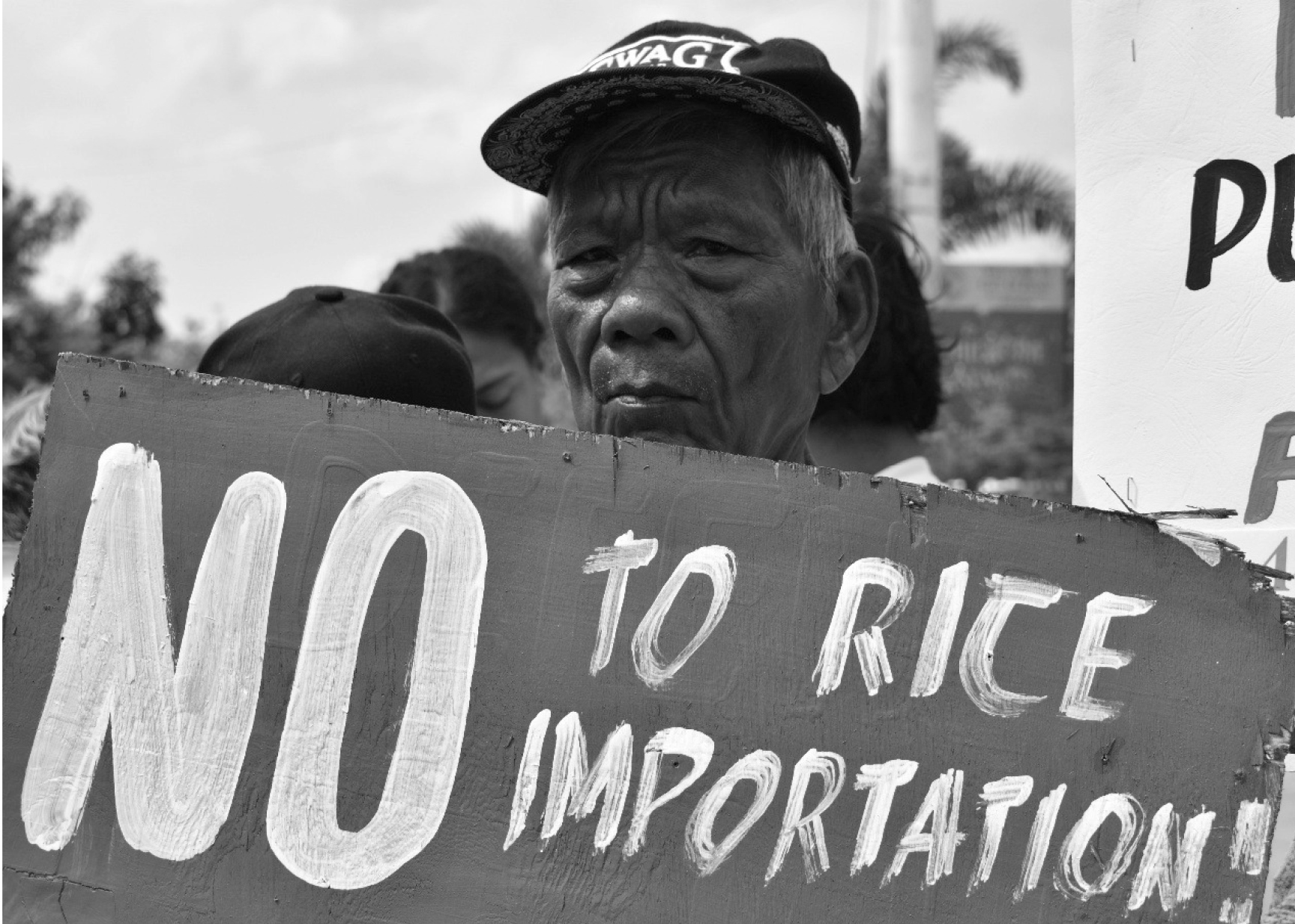Over a thousand farmers, consumers and various rice stakeholders led by Bantay Bigas held a protest dubbed as “Rise for Rice! Junk Rice Liberalization!” today, marking the first year enactment of RA 11203 or Rice Liberalization Law. Peasant and sectoral groups Amihan or National Federation of Peasant Women, Kilusang Magbubukid ng Pilipinas (KMP), Alyansa ng Magbubukid sa Gitnang Luson (AMGL), Katipunan ng mga Samahang Magbubukid sa Timog Katagalugan (KASAMA-TK), Gabriela, KADAMAY, National Food Authority Employees Association (NFAEA) and Anakpawis Party-list marched from Morayta to Mendiola and conducted a noise barrage using pots, casserole and other kitchenware
“One devastating year for our farmers and the local rice industry is enough for us to unite and demand an end to this law. ‘Pusong-bato’ si Pangulong Duterte sa paghiling sa mga magsasaka na bigyan pa ng pagkakataon ang Rice Liberalization Law gayong napakalinaw ng pinsala nito hindi lamang sa kabuhayan ng mga magsasaka kundi maging sa mga mamimili, mga kawani ng gobyerno, mga maliliit na negosyante sa bigas at mga manggagawa,” Cathy Estavillo, Bantay Bigas spokesperson and Amihan National Federation of Peasant Women secretary-general said.
Farmers from Central Luzon have suffered a loss of at least P25,000 per hectare last year as palay prices dropped to P7 per kilo during the peak of the harvest season.
In Cagayan, farmers endured more than P11,300 losses per hectare last October due to low farmgate price at P10 per kilo which remains the current price today.
In Sorsogon, which has not yet recovered from the damages brought by typhoon Tisoy, palay prices is at P11 per kilo while the lowest price of rice is at P36 per kilo and consumers are only allowed to buy a maximum of 5 kilos of NFA rice.
In a farmers’ consultation led by MASIPAG (Magsasaka at Siyentipiko para sa Pag-unlad ng Agrikultura) in Davao City last February 10-11, 2020, farmers using conventional farming methods in South Cotabato incurred a 75-85% loss on their net income. In Polonuling in Tupi town, farmers’ income were slashed from P57,130 prior to Rice Liberalization Law to P10,150 after the law’s implementation. Meanwhile in Lake Sebu, a farmer noted that their income reduced from P12,000.50 to P2,000.50. A comparative study from a farmers institute based in Surigao del Sur also shared their results, where landless farmers using chemical farming method are the most affected by Rice Liberalization, noting a negative income of P13,829.
For her part, Mimi Doringo, spokesperon of urban poor group Kadamay said that the law has failed to lower the prices of commercial rice in the market while the cheaper NFA rice at P27 per kilo has been scarce as a result of limiting the function of the National Food Authority to buffer stocking.
As RA 11203 decoupled the important functions of the NFA, it has threatened the job security of about 1,800 employees as result of the restructuring plan approved by the Governance Commission for Government-Owned or Controlled Corporation (GCG). The NFAEA has been at the forefront in opposing the law as it is anti-worker and anti-farmer.
Moreover, according to AGHAM (Advocates of Science and Technology for the People), food safety and food quality of rice is at risk as the Bureau of Plant Industry (BPI) was given an extensive task from its original mandate, putting a great pressure to keep up with phytosanitary services with the influx of rice imports.
“The country’s agriculture sector has been in chronic crisis 25 years since its membership to the World Trade Organization in 1995. Farmers are thrown into bankruptcy and indebtedness as past and present administrations continue to neglect the sector and institutionalize import dependency. RA11203 and the country being the world’s top rice importer is an expression of the anti-peasant legacy of the Duterte regime,” Rafael Mariano, former Anakpawis Partylist lawmaker and KMP chairperson emeritus said.
The Philippine Network of Food Security Programmes (PNFSP), as one of Bantay Bigas convenors, said that self- reliance and self-sufficiency is crucial in the attainment of a nation’s genuine food security.
Bantay Bigas, along with its member organizations, is pushing for the enactment of House Bill 477 Rice Industry Development Act (RIDA) as an alternative bill, primarily authored by Gabriela Women’s Party Representative Arlene Brosas. The bill proposes the authentic development program for the national rice industry, involving the three-year allocation of P495 billion, which includes P185 billion for its core programs and P310 billion for the procurement program of the NFA.
Ariel Casilao, former representative of Anakpawis partylist said, “The call to repeal Rice Liberalization Law is not an exclusive concern of Filipino farmers but of every Filipino as it undermines our food security. We take on the challenge to continue raising people’s awareness and gather the broadest support possible to scrap the law and push for pro-farmer and pro-people alternatives and hold this government accountable for abandoning the ‘food on the table’ agenda”.
Bantay Bigas continues to gather signatures for the petition to junk the law which will be submitted to the Senate and Congress on March 5 and March10 respectively. Last November 2019, 50,000 signatures were already submitted to the Committee of Food and Agriculture in both houses and to the offices of House Speaker Alan Peter Cayetano and Senate President Vicente Sotto III.
As part of the “Rise for Rice!” protest, the groups danced to the “One Billion Rising” led by GABRIELA, one of Bantay Bigas lead convenor organizations.
Likewise, farmers and peasant women under Amihan and KMP in Isabela, South Cotabato, Sorsogon provinces, Cebu and Iligan City held mobilizations as part of the “Rise for Rice! Junk Rice Liberalization!”protest.
Prior to the program in Mendiola, hundreds of farmers and peasant women from Central Luzon and Southern Tagalog together with urban poor groups protested in front of the Department of Agriculture central office in Quezon City calling for the immediate delivery of sufficient support services, production subsidy and financial assistance to rice farmers to help ease the impact of rice liberalization as depressed farm gate prices remain especially with the peak of harvest season this March and April. ###
For References:
Cathy Estavillo, Bantay Bigas Spokesperson
Rafael Mariano, Anakpawis Party-list Former Representative & Chairperson Emeritus of Kilusang Magbubukid ng Pilipinas

